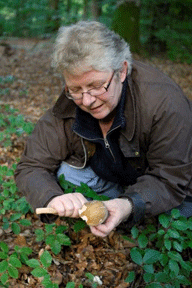
Sylvie Bisdorf hunting wild mushrooms
Text ©2009
Photos ©2009 by Guy Hoffmann
As the book flap of her splendid book, Culinary Luxembourg, says “Sylvie Bisdorff is the owner of Hotel-Restaurant Bisdorff in Berdof. This address is known throughout Luxembourg for its traditional cuisine: at the turn of the 20th century her grandmother was already welcoming locals and tourists alike to this idyllic spot in the Müllerthal. Sylvie Bisdorff was born in 1956, learned her trade at the Lycée Alexis Heck hotel school and from her father Valy Bisdorff, whose skills were enjoyed for some seventeen years by the Grand-Ducal family.”
Meeting Sylvie Bisdorff proved a unique experience for Lucy Gordan. While on a press trip organized by the National Tourist Board of Luxembourg to attend the impressive annual “dancing procession” in honor of St. Willibrord in nearby Echternach, Sylvie invited our Rome correspondent and her fellow-journalists to lunch twice: once for a tasting menu of her specialties and the next day for a buffet of Luxembourg dishes.
Our tastes in food are closely connected to our childhood — your first memories of food?
SB: My father Valentin was a very famous chef. I was born in the kitchen, I suppose. He worked both here at the family hotel and in the Grand-Ducal Palace in Luxembourg City. Our hotel was closed in wintertime, so he worked full-time for the Dukes. In summertime he was mostly here and, of course, sometimes at the Palace.
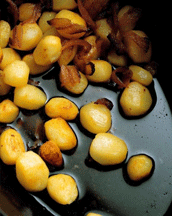 |
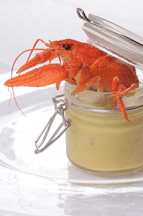 |
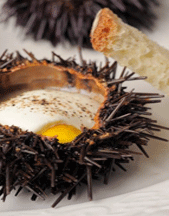 |
So your father was your mentor?
SB: Yes, and my sister’s too. Her name is Danièle. We call her Dan. She is three years younger than me. She is now my pastry chef, but she’s trained as an optician. I went to hotel school in Diekirch; she came much later to work here. Her passion is making pastry. In the kitchen I have a very good lady sous-chef at my side, my sister for desserts, and two other helpers to keep the kitchen clean.
What did you especially learn from your father?
SB: His recipes for lobster, crayfish, and game.
Other mentors?
SB: No, but I have always loved to travel and have visited lots of very good restaurants all through my life. On my next trip I’m going to Thomas Bühner in Osnabrück. He has two Michelin stars. Another of my favorite chefs is Alain Senderens in Paris.
What are the essential qualities of being a top chef?
SB: A deep passion for the profession; indefatigability;, you must never be tired; you have to work from morning ’till deep into the night. You have to resign yourself that there are other chefs who are just as good or even better than you, because you can’t think up all the new recipes in the world. You must visit your colleagues to see what they are doing and get inspired left and right. You must keep your eyes open and buy only top-quality produce. That should cover it.
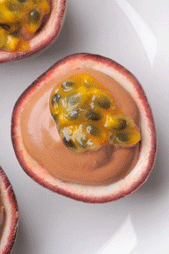 |
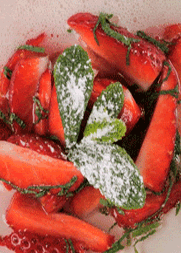 |
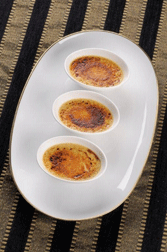 |
You are one of the first women top chefs that I have interviewed; why do you think it is so difficult for a woman not to become a top chef, but to stay one?
SB: Because it’s a very difficult and demanding profession. Many women also want to have a family and children. It also must not be forgotten that being a chef is a man’s world. For example, twenty years ago I applied for a job with a chef who had three Michelin stars and he answered: “I don’t employ women.” The situation is changing for the better now, but it’s still true that the famous restaurants mostly don’t employ women top-chefs. It’s still too difficult to balance family duties with the long hours of a chef’s profession. I was lucky because when I undertook this enterprise after my father died, I still had my grandmother and my mother to help me out with my daughter, who is 31 now and married with a baby. However, my daughter is adamant that she doesn’t want to continue this family tradition. There’s too much sacrifice involved: there are no weekends off, no holidays, no free evenings for going to the movies or out with friends.
What do you like best about your profession?
SB: The creativity and being with my guests. After I’ve finished in the kitchen, I like to make the rounds of the dining room to greet my guests and receive their compliments.
The least?
SB: Nothing really, except the fatigue. Even if you’ve had to stay up very late, the next morning you can’t stay in bed. You have to get up.
Your greatest professional satisfaction?
SB: Gorbachev’s visit on May 1, 2005. Also the Russian Foreign Minister Lavrov, and of course, the Grand-Duke’s family who come regularly.
Another great satisfaction was being the chef at the Luxembourg Embassy during the Olympic Games in Beijing last summer.
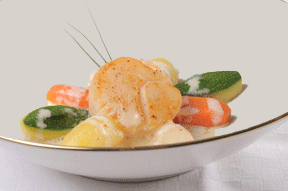
Coquilles St. Jacques
You have a television program?
SB: Yes, once a month on RTL Kichen, Luxembourg’s food channel, and twice a week on RTL Kichen’s radio channel. They are only transmitted here in Luxembourg., but I also appear as a guest on German television programs. I was recently interviewed by Channel 1 of Russian Television. The show will be transmitted on August 30 and seen by 20,000,000 people.
What’s your culinary philosophy?
SB: To buy produce of the highest quality, which doesn’t necessarily mean the most expensive, and to cook from my heart. A chef has to cook with love.
In a nutshell how would you define your cuisine?
SB: One which comes from my heart and from my gut.
Today you offered us a buffet of typical dishes from Luxembourg; can you give me the names of the most typical ones?
SB: Judd mat Gaardebounen [Pork Collar with Broad Beans]; Bouneschlupp mat Gromperenkichelcher [Broad Bean Soup with Potato Dumplings]; Gesolpertes mat Sauerkraut [Pickled Pork with Sauerkraut]; Liewerkniddelen [Liver Dumplings]; Kniddelen or Dumplings; Stäerzelen [Dumplings in Heath Corn Flour]; Kallefskapp mat Vinaigrette[Calf’s Head with Vinaigrette]; Panéiert Schwengsféiss [Breaded Pig’s Knuckles]; Schnéicrème [Floating Island]; Quetschenflued mat Schmand [Plum Tart with Whipped Cream]; and Schuedi [Sugar Tart], just to name a few.
Your signature dish and other specialties?
SB: Kriipsen, or crayfish, all crustaceans, especially my lobster dish: “Homard Valentin Bisdorff,” game, and all my local dishes from Luxembourg. I learned the recipes from my father.
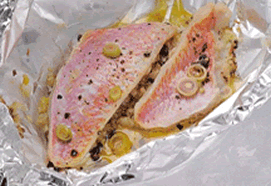 |
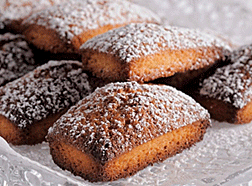 |
What do you believe is the reason for your success?
SB: Although I owe a lot to my father, his fame was a disadvantage for me at the beginning. I owe my success on how I communicate and present myself to my guests, and to the fact that my top-quality ingredients make my cuisine top-quality, not to mention my dedication and hard work.
Up to now you have told me about Sylvie Bisdorff the chef, but my readers and I would like to know more about you. For example, what is your favorite food?
SB: Sea urchins and lobster.
Your favorite wine?
SB: Champagne.
Flower?
SB: White orchids and all blue flowers.
A dish you don’t like?
SB: None.
Chefs are well-known for having collections, often of motorcycles, fast cars, or watches; what about you?
SB: Pink glass, Meissen porcelain, pepper mills, and coffee mills. Paintings with lobsters here at the restaurant. At home I have quite a special and famous painting collection.
Have you written a cookbook?
SB: Yes, Culinary Luxembourg: Country, People, and Cuisine which includes more than 100 of my recipes. It was published in French, German, and English by Editions Guy Binsfeld in 1997. It is available for sale directly from me: Hotel Le Bisdorff, 39, Rue Heisbich, L-6551Berdorf, Luxembourg, tel. 001-352-(0)-79-0808, www.hotel-bisdorff.lu, e-mail: hotelbisdorff@pt.lu.
Are you writing another one now?
SB: Yes, it will be published in September. Its working title is Ma Cuisine. It will only be published in French and German.
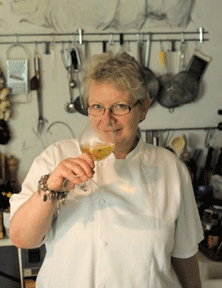
What are your feelings about food critics and restaurant guides? Have they been a help to your career, or have they added unnecessary stress?
SB: When I travel to a place I’ve never been before, I consult the Michelin and Gault
Millau guides to help me decide whether I want to go to a three-star restaurant, or if I’d prefer to eat in a hole-in-the-wall.
Personally, guides don’t stress me. I think it’s a matter of character how upset you get if you don’t receive the rating you hoped for. I’m classified in the Michelin as a hotel, not a restaurant, so I have no stars. In Gault Millau my rating is 14/20, which would be the equivalent of one star in the Michelin guide.
Other chefs you admire?
SB: Harald Wohlfahrt at the “Schwarzwaldstube,” Alfons Schuhbeck, Alain Chapel (who is deceased now), young and innovative René Mathieu, Jean-Georges Klein, and Heinz Beck. I admire them because I have wonderful memories of eating at their restaurants. I also like a restaurant in Rome called “34,” simple but delicious.
I love Rome; I go there and to Paris every year. I’m to-the-kitchen born, but also born-to-travel. I’ve been many places all around the world. I travel for the local food, the local art and museums, and for relaxation. I love the Caribbean and cruises.
Do you have a favorite museum?
SB: The Louvre and the Van Gogh Museum in Amsterdam.
Do you have a favorite painter?
SB: Many, but my favorite painter from Luxembourg is Fernand Roda. He lives in Dusseldorf and was a protégé of Joseph Beuys .
If they hadn’t become chefs, Heinz Beck wanted to be a painter; Gualtiero Marchesi a pianist; Thomas Keller the shortstop for the New York Yankees; Vitor Sobral a judge; what about you?
SB: An actress. When I go into my dining room after I’ve finished cooking, I feel a bit as if it’s my stage.
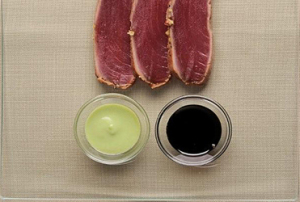
& & &
